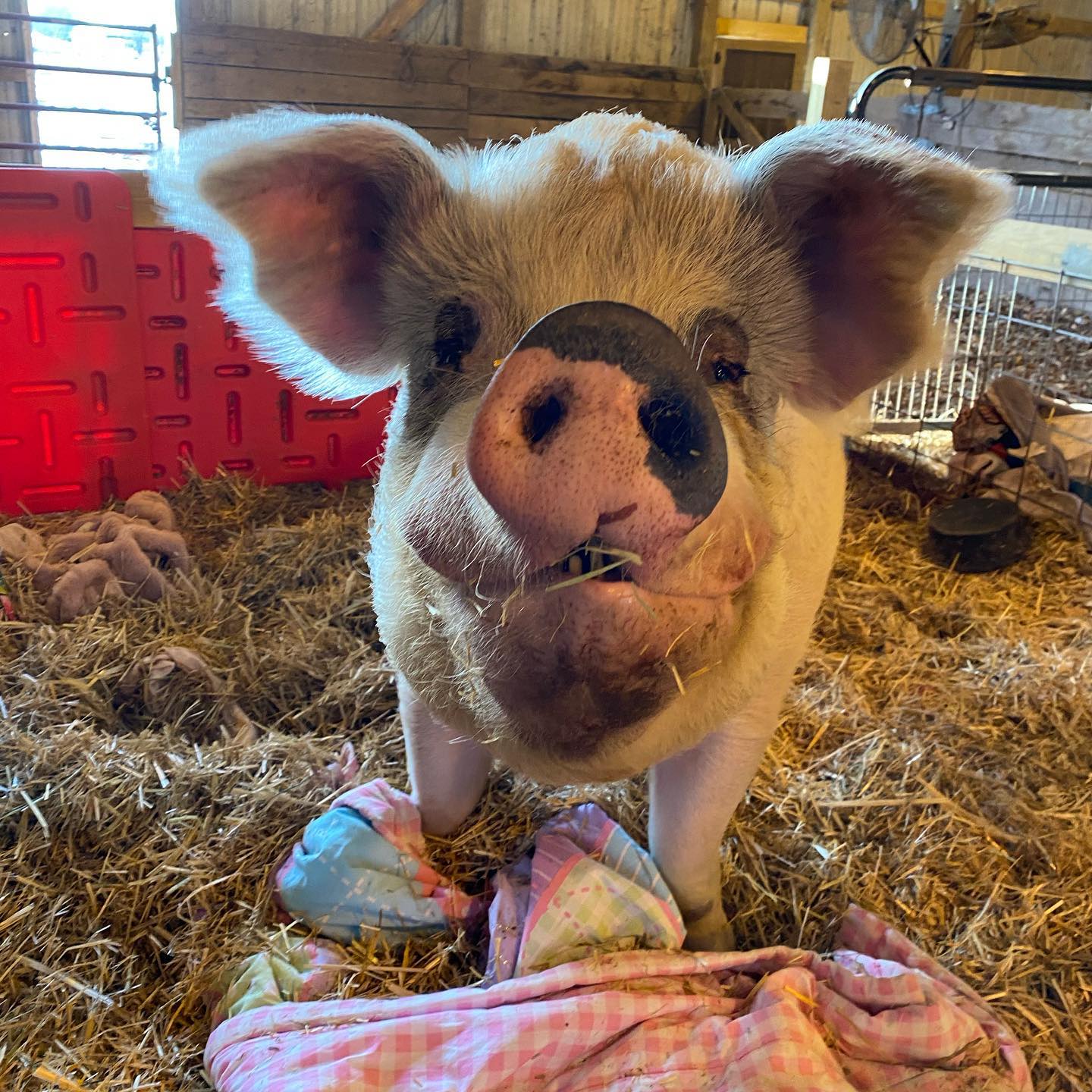Blog
Ridiculous Love: One Couple’s Harrowing Journey to Save the Life of their Friend (Who Just Happened to Be a 700lb Pig)
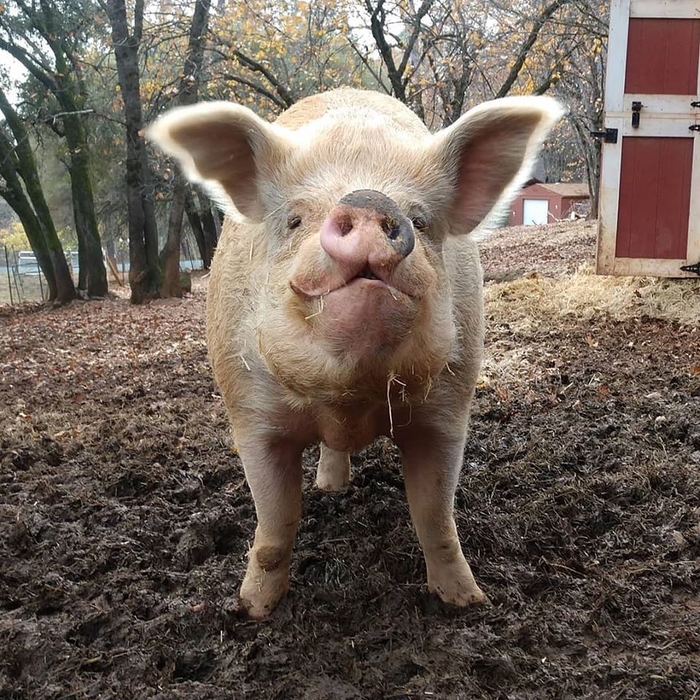
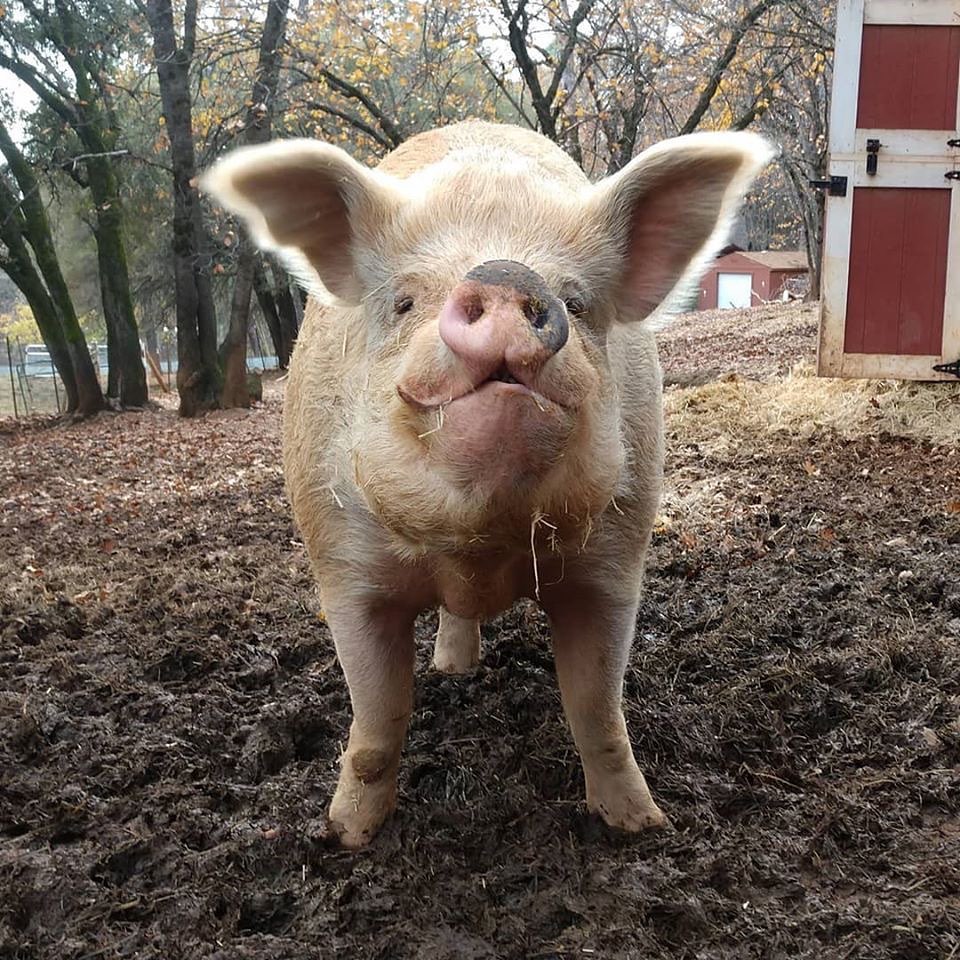
We have a surging crisis in the sanctuary world as it relates to veterinary care due in large part to the perception of the ‘purpose’ and value of a farmed animal’s life. Every state now has an animal sanctuary – safe havens for animals rescued from neglect, abuse, or torture – most often from the cow, chicken, pig, and dairy industries. What happens to these animals bred for food as they age while living in sanctuary? Most animals raised for meat or dairy are bred to grow incredibly quickly, to produce more “meat” and are heavier than their bones can bear over time, or produce more milk or more eggs, more quickly; their health and wellbeing are oftentimes the last consideration.
Sanctuaries and rescues like Jameson pledge to care for their residents for their lifetimes. But what happens when these animals are suffering from the way they were bred or from disease or disorders from the places they came from, which increasingly, they are?
As a sanctuary that provides home, love, and care to domestic animals, similarly to those across the globe, we are facing a problematic situation related to veterinary care that needs to be addressed.
Today, I want to share with you a very touching story of courage, awareness, and change for a pig named Cromwell who lives at friend sanctuary, Blackberry Creek Farm. Thank you for reading and if you are able, donating.
Ridiculous Love: One Couple’s Harrowing Journey to Save the Life of their Friend (Who Just Happened to Be a 700lb Pig)
Guest blog from Blackberry Creek Farm Animal Sanctuary, Danielle & Josh Hanosh
When Cromwell didn’t come to breakfast one chilly January morning at Blackberry Creek Farm Animal Sanctuary, Executive Director, Danielle, knew something was wrong. Each morning for over six years, Cromwell would meet one of his human parents at the upper gate of the pig pasture with a big smile. As soon as the brightly colored bucket appeared, he’d open wide, head tilted back, asking for breakfast to be poured directly into his mouth. It was a joyful morning ritual for all, but on this particular day Crommy was nowhere to be found.
Upon closer inspection he was located sitting in his barn, waiting with his mouth open for breakfast, but clearly hesitant to walk. Pigs bred for food production commonly have hoof issues as a result of the selective breeding that makes them unnaturally heavy, and indeed, there was a large horizontal crack all the way across his right lateral toe near the coronary band.
His regular veterinarian, Dr. Jess, came for a visit and alarmed at the size and location of the crack, referred Cromwell to the local university veterinary hospital, rated one of the best in the country, where they could take x-rays and culture the bacteria to determine a proper course of antibiotics.
After 24 hours at the university hospital, the news wasn’t looking good. The infection in the toe had spread to the bone and there was swelling and gas buildup inside the hoof wall. Blackberry Creek discussed options with several vets including Esther the Wonder Pig’s foot surgeon in Canada. An arthrodesis surgery was scheduled to debride the infection in the bone, clean it out, and cause the joint to fuse.
Cromwell came through the surgery with flying colors, and he spent the next several weeks receiving antibiotic shots, bandage changes, and pain medication. The updates from the university hospital continued to be good, and the doctor was prepared to discharge him after just one more bandage change.
The following day, Cromwell’s sanctuary family got a phone call they were not expecting in the least… “Unfortunately, I have some very bad news for you,” the doctor’s voice on the other end of the line said sympathetically. Upon taking the bandage off, they had found the hoof on the other toe had cracked as well, likely from supporting all of his weight while up on the block, and a second x-ray showed the infection had spread to the second bone in his toe. With infection, his size, and his pre-existing arthritis, euthenasia was the hospital’s only recommendation. There was no other option, they said.
Danielle asked about another surgery, about different antibiotics in an IV catheter, about toe amputation, about a prosthetic, and was told no one would try any such thing on a pig of his size. Too big. Too hard. Too many complications. Ridiculous to attempt.
Still refusing euthanasia for the pig who was very much still healthy and full of life, she insisted on finding a second opinion. The doctor agreed to continue pain meds and palliative care but wanted to know within less than 24-hours what the plan was. It was Thursday afternoon.
By Friday morning Danielle had reached out to over 45 veterinarians at 21 different universities and private practices along with two prosthetic companies and six other sanctuaries who had experienced large farm pigs with toe amputations. Many responded, some did not, but one stood out… a large animal surgeon from Purdue University named Jan Hawkins. He took time out of his busy schedule to have a long conversation with Danielle about options for Cromwell, his previous experience performing hoof surgeries on large farm animals and suggestions that the local hospital where Cromwell was staying could try. He even offered to fly to California to perform the surgery as a guest surgeon as long as the local university hospital would provide the intensive after-care of sedated bandage changes, IV antibiotics, etc.
Bionic Pets, an innovative animal prosthetics company, also graciously agreed to help with Cromwell’s case and planned to design either an appropriate brace or a special prosthetic with an artificial toe to distribute his weight evenly should he lose his own toe during amputation.
Danielle called the local university hospital back and relayed the conversation with Dr. Hawkins. Surely as a teaching hospital they would be thrilled to have him as a guest surgeon and learn from his expertise!
The message back from the faculty doctors was inconceivable. They might consider allowing him to fly out to do the surgery, but would not consent to being a part of the after care. Without regular sedated bandage changes and flushing of the wound to keep it clean, it would never heal properly and infection would spread. They believed keeping Cromwell alive at this point was ridiculous, but denying him medical care from an experienced, Purdue University Veterinary Hospital surgeon was, apparently, perfectly reasonable.
The next week Josh and Danielle made the difficult decision to take their beloved pig on a 30 hour road trip to Purdue where he could have a fighting chance with the only veterinarian willing to give it to him.
The faculty doctor at the local university tried very hard to insist that this plan was not consistent with high standards of animal welfare. After all, as doctors, they had taken an oath to “do no harm.” This was an ironic argument since they wanted to euthanize Cromwell when there were still other viable options, not to mention this particular institution has a well-funded primate research lab, regularly experiments on dogs, has a slaughterhouse on campus a few blocks away, and had a staff refrigerator being cleaned outside the large animal hospital with a “Beef, It’s What’s For Dinner” sticker plastered to the front. A reassuring message when someone is bringing their beloved companion farm animal to seek care…
In the end, the university hospital insisted that driving Cromwell across the country was absolutely ridiculous and not in his best interest as traveling is stressful for pigs. Josh and Danielle agreed wholeheartedly and asked again if the staff would be willing to do the surgery themselves to avoid the road trip. It was a hard no. Ridiculousness seemed to be relative.
The university hospital resident on Cromwell’s case was luckily very kind and helpful and took the lead on getting paperwork done and a microchip implanted for him to travel over state lines.
The next few days were full of careful planning in order to arrange a team of volunteers to hold down the fort at Blackberry Creek for the other 86 animals residing there. When departure day finally arrived, Dr. Hawkins called with terrible news. The large animal hospital at Purdue was closed due to a salmonella outbreak, and Cromwell would have nowhere to go once he reached Indiana. Wanting to start him on new antibiotics immediately, Dr. Hawkins sprang into action, quickly contacting a sanctuary an hour from Purdue that specialized in pigs called Oinking Acres. Started by a young woman named Olivia and supported by her mom and family, Oinking Acres primarily cared for potbelly pigs, but readily agreed to be a soft landing spot for Cromwell and care for him until he could be transported to the hospital.
When Danielle arrived at the local university vet hospital to pick up Cromwell, she expected to see the staff have to use a skid or some of their heavy machinery to carefully lift him into the trailer as the hospital continued to insist that his injuries were painful and debilitating and that he was barely walking. What she did not expect was a pig who perked right up when he saw her, walked steadily without even a limp to the trailer, and loaded right up the ramp for a donut.
Danielle and Cromwell left the hospital at approximately 7 PM on Wednesday evening and drove an hour East stopping at home to pick up Josh and put all of the other sanctuary animals to bed for the night. With a truck full of vegan snacks, caffeine, adrenaline, and hope, they started out on what the map said was a 30+ hour journey to Indiana.
With temperatures dropping below what was predicted and 65 mph winds through Wyoming, Cromwell’s parents struggled to keep him warm, stopping many times to warm him up and try to insulate the open-windowed horse trailer with bales of straw and blankets. Several times they thought they might lose him and even laid with him in the trailer with electric blankets in the parking lot of a Nebraska Walmart, warming him externally and shifting to a more southern route to avoid a snowstorm in Iowa. On Friday evening, after 46 hours straight on the road with only a few hours of sleep each, they made it. Cromwell was safe and sound, loved and cared for, and he seemed to know it.
The next morning they met Dr. Hawkins for breakfast and got to know the man who had selflessly offered to help strangers from across the country to save a pig who was family to them when no one else would help. His perspective and insights were eye-opening and he shared his wisdom on many similar cases. He drove an hour to see Cromwell that day and immediately started him on new antibiotics to get the infection under control and put a hard cast on his foot for support.
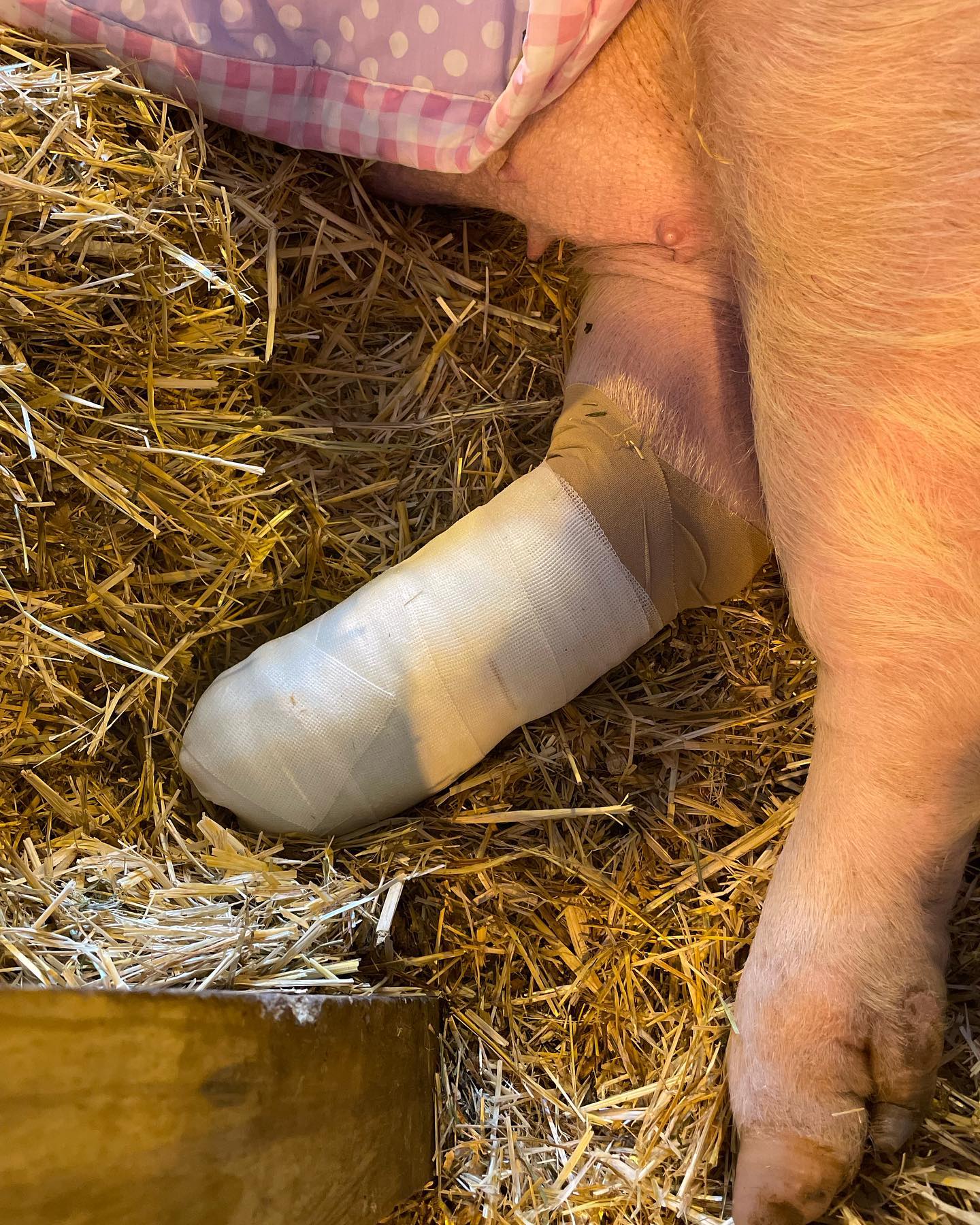
When the Purdue hospital reopened a week later Cromwell was sedated, and Dr. Hawkins cut into his neck and placed an IV in his jugular vein. With a catheter safely surgically inserted into his neck, the doctors could now give him intravenous antibiotics and pain medication whenever needed without any kind of stress or pain. Radiographs showed the new antibiotics were tackling the infection and a new cast was put on to immobilize the toe and help the damaged bone to regrow.
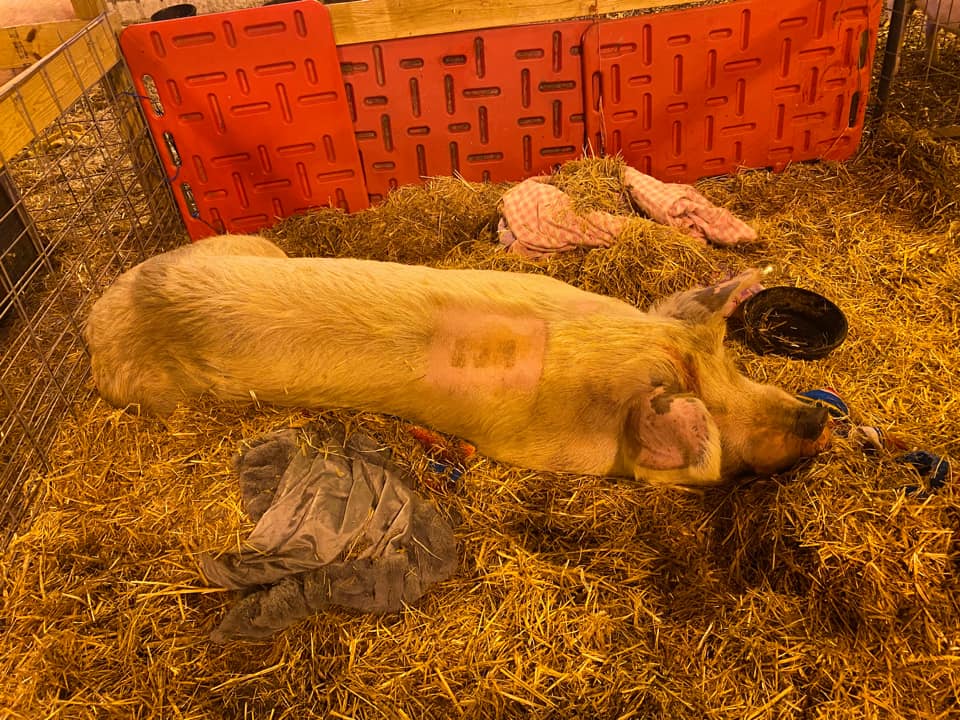
Two weeks later, his prognosis is looking wonderful. He is happy, pain-free, and the latest x-rays showed promising bone growth which means a bone graft surgery may not even be necessary let alone an amputation! Though everyone at Blackberry Creek is exceedingly grateful they were able to find a doctor with such knowledge, skills, compassion, and ingenuity as Dr. Hawkins, the reality is that it should not be this difficult in this day and age to get farmed animals the care that they need and deserve.
It is ridiculous that humans have bred large farm pigs to grow to unnatural sizes for food production, causing them significant medical issues, and then refuse to figure out how to solve said problems when things go badly for the animal.
It is ridiculous that some antibiotics, cancer treatments, and other medications, cannot legally be used on farm animals even in a sanctuary setting because the USDA and state laws consider certain species “food animals.”
It is ridiculous that a pig suffering from a toe infection and arthritis would be refused treatment and simply euthanized at one of the leading veterinary teaching hospitals in the country.
What would motivate two people to drive across the country and spend tens of thousands of dollars to save the life of their pig friend? A desire to educate about speciesism, a passion to advocate on behalf of farmed animals, and a fiercely ridiculous love.
If you'd like to contribute to Cromwell's care, click here.
Please note "For Cromwell" in the Notes and Gift Details section.
